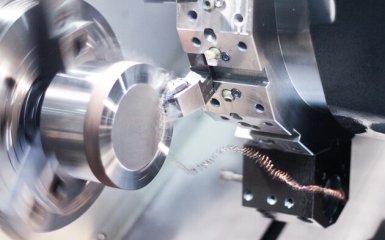Shipments to Russia of an essential class of modern machine tools from China have increased tenfold since the full-scale invasion of Ukraine by the Russian Federation. Chinese manufacturers now dominate the trade in high-precision, numerically controlled devices (NCD) essential to the Russian military industry.
China increased supplies of modern machines to Russia
The rapid increase in the supply of NCD machines, which allow extremely precise milling of metal, is causing great concern among Ukraine's allies amid attempts to limit Russia's access to this equipment.
Russian customs data show that Chinese manufacturers shipped $68 million of NCD tools in July 2023, the latest verifiable figure available, compared to just $6.5 million in February 2022.
Michael Raska, Associate Professor of the Singapore School of International Studies, named after S. Rajaratnam, said that the export of NCD machine tools exemplifies how China and Russia are deepening their military-industrial partnership.
As Raska explained, Beijing and Moscow share the same political interest in challenging and confronting the US.
The fact is that Russia has been cut off from importing European equipment, and it has no other choice but to rely on China, he added.
Supplies of NCD tools to Russia from the EU, which has historically been the primary source of such devices for the Russian Federation, have been sharply reduced due to the strengthening of sanctions from February 2022. Analysts say that Moscow seeks to obtain CND tools from sources outside of international control.
Customs declarations show that Chinese-origin NCD devices accounted for 57% of Russian imports by value in July, up from just 12% before full-scale war. This indicates that Moscow also continued to import significant volumes of NCD tools manufactured in Taiwan and South Korea.
In November, the US introduced wide-ranging sanctions. Chinese companies that continue to trade with Russian importers now risk facing US restrictions that could jeopardize their ability to change in other markets.
Beijing insists it does not supply lethal weapons to Moscow and denies supporting the invasion of Ukraine, but also refuses to impose sanctions. Trade between China and Russia, including oil, machinery, consumer goods and cars, helps prop up the sanctions-hit Russian economy. Chinese leader Xi Jinping said in October 2023 that annual trade between the two countries had reached a "historic high" of nearly $200 billion.
C4ADS conflict analysis analyst Allen Maggard says NCD tooling helps rapidly produce complex components from metal and other hard materials with consistent accuracy. These qualities make NCD machine tools especially valuable for defense production.
At the same time, such devices are quite large, making it more difficult to smuggle them into Russia from Western countries than smaller components such as microchips.
An analysis of export records by the FT shows that some of the leading exporters have close links to China's People's Liberation Army.
For example, the Chinese company Wuhan Huazhong Numerical Control increased exports to Russia. In 2017, it was the main contractor in the project to replace foreign NCD systems with domestic ones in the country's defence industry. It worked with the Chinese jet fighter manufacturer Shenyang Aircraft Corporation.
HuazhongCNC was itself the target of US sanctions between 2008 and 2010 under a law that prohibits the transfer of military technology or equipment to Syria, Iran and North Korea.
Emily Kilcrease, a former deputy assistant US trade representative, said Washington has been reluctant to use financial sanctions against Chinese companies that help Russia, fearing that doing so would reduce the effectiveness of such measures in the event of a crisis in relations with Beijing.
This dynamic regarding the overuse of sanctions is of great concern to the administration. They know that these sanctions and export controls will never be perfect. And that's why they're really focused on Russia receiving low-quality goods, Kilcrease added.
An analysis by the Bank of Finland's Institute for Emerging Economies shows that Russia's average price for a range of Chinese goods that could support its military efforts rose by 78% from 2021 to 2023. The cost of Chinese exports of the same goods to other countries increased by only 12%.
According to Oleksandr Gabuev, director of the Carnegie Eurasia Center in Berlin, ongoing US sanctions and export controls against Beijing's military contractors on other issues have led many Chinese companies to ignore the potential risks of US sanctions.
Many Chinese companies expect that sooner or later all companies related to the People's Liberation Army will fall under sanctions, Gabuev explained.
It is not clear how Russia deployed its imported Chinese NCD devices. Maggard believes that Russian defense plants are just beginning to use Chinese machines.
Analysts cannot yet accurately identify whether Chinese NCD machines are used in the Russian Federation. You can see NCD machine tools from European, Taiwanese, Korean, or Japanese suppliers in photos and videos on social networks or propaganda programs.
Other sources confirm this picture. For example, customs records show that a significant Russian importer of NCD machine tools, CFT, currently under sanctions, imported very few Chinese-origin products until last July. The company's internal documents leak shows it is a supplier of Russian defence manufacturers, particularly Aeroscan, which produces Lancet drones.
Olena Yurchenko, an analyst at the research and human rights organization Economic Security Council of Ukraine, said it would be "almost impossible" to use a Chinese NCD machine tool at a factory that built its production processes on another manufacturer's tool with different technical characteristics.
The preference for equipment from other countries may also reflect scepticism about the quality of Chinese machines among defence manufacturers in Russia. Maggard points to recent public comments by a Russian industry expert who said Chinese tools are less accurate and have a shorter lifespan than equipment made by German and Japanese companies.

